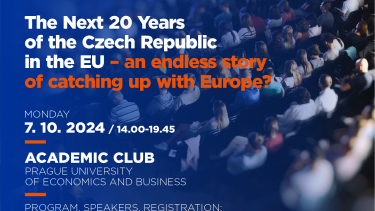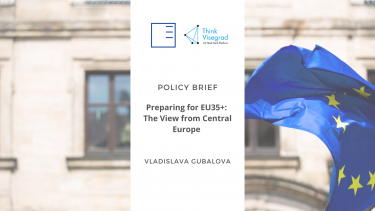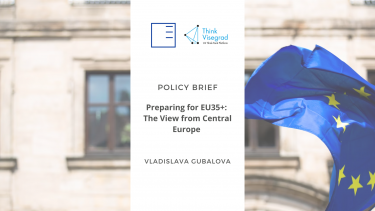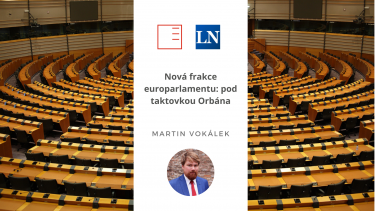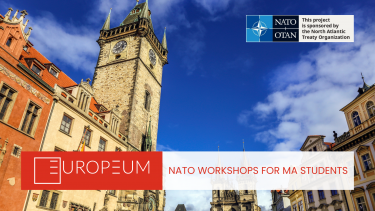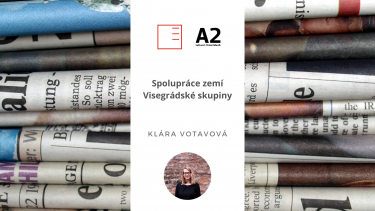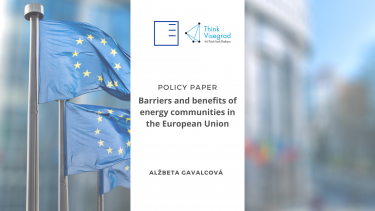Conference | The Next 20 years of the Czech Republic in the EU - an endless story of catching up with Europe?
How has the Czech Republic changed during its membership in the EU, how has it managed to catch up economically with its western neighbours? Where has it moved and where is the next potential? And does the Czech Republic have a strategy to build on? Come and listen to renowned speakers from across Europe and join the discussion on what we have achieved in the last 20 years in the EU and where we are moving as a country. We are co-organising the conference with the Prague University of Economics and Business.
Show more
Policy Brief | Preparing for EU35+: The View from Central Europe
Despite the historical support of EU enlargement policy by the Visegrad Four (V4), these Central European states are now faced with the challenge of reconciling their stances with the new realities of the process. As Ukraine and Moldova opened their accession negotiations, the EU seems to be torn on the questions associated with the future enlargement(s) - institutional reforms and changes within the EU budget. Transitioning from economic beneficiaries to potential contributors, the V4 states must evaluate the potential political and economic impacts of new members on both the EU and their domestic levels. Writes and proposes recommendations Vladislava Gubalova from GLOBSEC.
Show morePolicy Brief | Příprava na EU35+: Pohled ze střední Evropy
Navzdory historické podpoře politiky rozšiřování EU ze strany zemí Visegrádské čtyřky stojí tyto středoevropské státy před výzvou, jak sladit své postoje s novou realitou tohoto procesu. Vzhledem k tomu, že Ukrajina a Moldavsko zahájily přístupová jednání, je EU rozpolcena v otázkách spojených s budoucím rozšířením - institucionálními reformami a změnami v rámci rozpočtu EU. Při přechodu od ekonomických příjemců k potenciálním přispěvatelům musí státy V4 vyhodnotit potenciální politické a ekonomické dopady nových členů jak na EU, tak na své domácí úrovni. Píše Vladislava Gubalová z GLOBSEC.
Show moreLidovky.cz | New political group in the European Parliament: under the baton of Orbán
Visegrad sovereigntists. This is the name given by European circles to the upcoming new faction of the European Parliament, which is expected to include seven MEPs from the Czech ANO movement. The leader of the Czech opposition, Andrej Babiš, who led his MEPs out of the influential liberal Renew Europe, is working with Hungarian Prime Minister Viktor Orbán to establish the new group. Martin Vokálek, director of EUROPEUM Institute, comments on its formation.
Show more
Lidovky.cz | Nová frakce europarlamentu: pod taktovkou Orbána
Visegrádští suverenisté. Tak evropské kuloáry titulují chystanou novou frakci Evropského parlamentu, do níž by dle očekávání měla usednout sedmička europoslanců hnutí ANO. Předseda opozice Andrej Babiš, který vyvedl své europoslance z vlivné liberální frakce Renew, se na založení nového uskupení podílí s maďarským premiérem Viktorem Orbánem. Vznik nové frakce komentuje Martin Vokálek, ředitel Institutu EUROPEUM.
Show more
Call for Participants: Euro-Atlantic Future of Ukraine and Eastern Europe: Views from Visegrad
Are you a Master’s student from the Czech Republic, Hungary, Poland, Slovakia keen on international relations and NATO's strategic future? Join our workshop series to engage with experts, present your views on NATO’s Open-Door policy, and network with peers from the region.
Show more
NATO workshopy pro magisterské studenty: Euroatlantická budoucnost Ukrajiny a východní Evropy: Názory z Visegrádu
Jste studentem magisterského studia z České republiky, Maďarska, Polska nebo Slovenska a zajímáte se o mezinárodní vztahy a strategickou budoucnost NATO? Zapojte se do naší série seminářů, na kterých můžete diskutovat s odborníky, poděli se o své názory na politiku otevřených dveří NATO a navázat kontakty s vrstevníky z regionu.
Show more
A2 | Cooperation of the Visegrad Group
Cooperation inside the Visegrad Group depends on the political situation of each country. In recent years, the alliance has drawn attention to itself with its criticism of the southern European states and anti-immigrant rhetoric. Klára Votavová, a researcher at EUROPEUM Institute, wrote her commentary for the biweekly A2.
Show moreA2 | Spolupráce zemí Visegrádské skupiny
Spolupráce zemí Visegrádské skupiny závisí na politické situaci jednotlivých států. V posledních letech na sebe aliance upozornila kritikou států jižní Evropy a antimigrantskou rétorikou. Svůj komentář pro deník A2 sepsala Klára Votavová, výzkumná pracovnice Institutu EUROPEUM.
Show morePolicy Paper | Barriers and benefits of energy communities in the European Union
Energy communities are an effective means to decentralize and renew our energy systems with sustainable solutions as they are usually based on renewable energy. They have already started emerging in 1970´s, yet there has been a significant increase in their development only in recent years, also in terms of their introduction into the EU legislation. Especially in Western and Northern European countries the concept already enjoys vast popularity. On the other hand, in Central and Eastern European countries (further referred to as CEE) energy communities are only beginning to emerge. The policy brief (based on literature and interviews with various stakeholders ) examines the benefits energy communities may bring, and more importantly, the main obstacles remaining in their way for greater evolution in the CEE region – and especially Visegrad countries (V4). As these initiatives progress, sharing the best practices will ensure the success of the community energy in the energy transition. Writes Alžbeta Gavalcová.
Show moreStaroměstské náměstí 4/1
Prague 1 - Staré Město
110 00
tel.: +420 212 246 552
email: europeum@europeum.org
https://www.europeum.org
